Reviews
Edward F. Cline
USA, 1940
Credits
Review by Evan Kindley
Posted on 31 July 2009
Source Universal DVD
Categories Women of the West
Mae West is the type of woman you don’t come across in popular culture too often these days: zaftig, frankly sexual, verbally deft, and above all self-confident. Whereas today’s female comedy stars often play on their putative flaws or shortcomings (Tina Fey, Renée Zellweger, Amy Adams, I’m looking at you), West did it the other way around: her unshakeable, perhaps even unwarranted self-esteem is the secret to her comic success. West had already had a long career as both a writer and performer before she began appearing in films at the age of thirty-eight, and she refused to alter her va-va-voom persona one whit as she moved toward what in Hollywood usually counts, then as now, as dowager age. In West’s world, every man is putty in her hands and every remark sets her up for a punch line. Her outsize charisma is thus a natural fit for the Western, a genre built on bluff and bluster and exaggerated gender roles.
In My Little Chickadee, West plays Flower Belle Lee, a lady of loose morals and hidden resources. After being abducted by a virile masked bandit modeled on Douglas Fairbanks’ Zorro, she puts the “sin” in Stockholm Syndrome by entering into a torrid affair with him. Soon after she turns back up in town, setting up the first of many echt Westian double entendres: “I was in a tight spot but I managed to wiggle out of it.” But it soon comes out that Flower Belle is cozy with her kidnapper, leading to her banishment for being a “menace to the community,” “not to return until you’re respectable and married.”
Soon Flower Belle is on a train headed to frontier town Greasewood City, chaperoned by town busybody Margaret Hamilton (just off her historic turn in The Wizard of Oz as the Wicked West of the West). That’s where she encounters Fields’ character, witless con man Cuthbert J. Twillie, first seen sleeping on the railroad track alongside his taciturn, and unexplained, Native American sidekick (played by ex-blackface performer George Moran). Where Flower Belle is brassy and fearless, Twillie is over refined and cowardly. The difference in their temperaments is immediately evident: when a band of Indians suddenly attacks the train, Twillie’s response is to shout “I hate you!” and fumble with a child’s slingshot. Flower Belle, on the other hand, fends off the aggressors with a six-gun in each hand. Still, upon seeing Flower Belle, “yon damsel with a hothouse cognomen,” Twillie is immediately smitten, and isn’t long before he’s caressing her “symmetrical digits” and proposing marriage. “I will be all things to you,” Twillie promises, “father, mother, husband, counselor, jackanapes, bartender… ” “You’re offering quite a bundle, honey,” Flower Belle replies. The wedding ceremony is performed on the train, by a fellow passenger who’s pressed into service as a minister.
The happy couple, freshly married, arrive in Greasewood City, a frontier town with a law-and-order problem like all the rest. The plot from this point on borrows liberally from the previous year’s Destry Rides Again, whose success Universal was trying to replicate: an unscrupulous villain (in this case saloon owner Jeff Badger) arranges for a drunken incompetent (in this case Twillie) to be appointed sheriff. This keeps him busy for most of the rest of the film and lets Flower Belle cozy up to both Badger and an earnest newspaperman named Wayne Carter, while continuing to fend off Twillie’s unwanted advances. (Flower Belle also gets a song á la Destry, the decidedly sub-Dietrichian “Willie of the Valley.”)
My Little Chickadee is a lot more earthbound, and less gag-oriented, than Fields’ best work: it lacks the absurd vaudeville illogic of The Bank Dick or Never Give A Sucker An Even Break (though a few moments, like Twillie’s battle with a feather boa while attempting to eat a bowl of a soup, come close). The script is co-credited to the two stars, but was reputedly mostly West’s, which may explain why Fields seems slightly out of character. Twillie is much sweeter than Fields’ usual curmudgeons, though his irascibility level does start to climb towards the end of the picture. Basically he’s a patsy for Flower Belle, and never comes close to figuring it out, a funny enough conceit in itself but one which doesn’t allow Fields to activate the sense of cosmic grievance that’s such an essential part of his comedy.
West, on the other hand, plays to her strengths - perhaps a little too much so. Her performance, spirited as it is, basically boils down to a few pungent exchanges (e.g., “I wonder what kind of woman you really are?” “Too bad I can’t give out samples”; or “Aren’t you forgetting you’re married?” “I’m doing my best”) and her trademark sideways leer, which never leaves her face no matter what she’s confronted with. (For instance, upon finding a goat in her hotel room, she asks saucily: “What’s your name, eh?”) Her best scene by far is also the movie’s lewdest and most suggestive, wherein she takes over teaching a classroom of teenage boys and manages to get their attention. “Two and two is four and five will get you ten if you know how to work it,” West tells the class, when asked to explain addition. One can only imagine what West might have done with this set-up in the pre-Production Code era; she ends the scene with a little jab at the censor, reading off the blackboard “I am a good boy. I am a good man. I am a good girl” and remarking, “What is this, propaganda?”
The productive contrast between West and Fields is not pushed as far as it might have been: they spend much of the movie on parallel tracks. (There may be behind-the-scenes reasons for this; the pair apparently hated each other.) The stars’ few scenes together play off their mutual incompatibility, as Twillie attempts to woo Flower Belle with high-end verbiage — “Just one little osculation!” — and she brushes him off with total disdain. But the juxtaposition has a certain justice nonetheless, in part because both comics play with a certain sense of superiority to their surroundings. Fields’ usual shtick is to be more elevated than the people he talks to, in language and sensibility — a parody of a fop who speaks in nonstop fustian, dropping words like “chicanery” and “parcel of rogues” for the benefit of no one in particular. West, on the other hand, is streetwise, always working an angle or playing a game. Both tend to play a scene as if they’re the only ones in it (Fields squinting past his fellow actors, West flirting through them), and neither does much to acknowledge the fact that they’re in a Western.
Of course, My Little Chickadee is not really about the Old West so much as it is about Mae West: in the end Greasewood City is just another market for her wares, and wiles. That the entire male citizenry of a small Western town would be wrapped around the finger of a middle-aged lady from Brooklyn (supposedly Chicago, but come on, that accent) is, shall we say, a tad unlikely, but it’s a given in West’s world. Similarly, Twillie’s over-the-top uxoriousness, however out of character it may be for Fields, is perfectly in keeping with the generally ga-ga reaction that Flower Belle elicits. In the film’s famous final scene Fields and West trade catchphrases — Twillie inviting Flower Belle to “come up and see me sometime,” and she responding “I’ll do that, my little chickadee” - an act of affectionate reciprocity on West’s part without precedent in the rest of My Little Chickadee. But note that it’s West who gets the last word.
More Women of the West
-
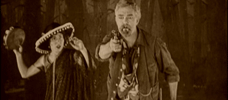
49-17
1917 -
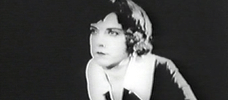
The Gun Woman
1918 -
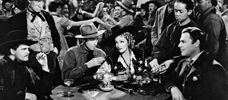
Destry Rides Again
1939 -
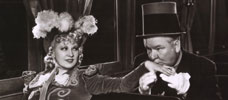
My Little Chickadee
1940 -
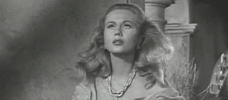
Colorado Territory
1949 -
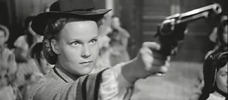
Westward the Women
1951 -
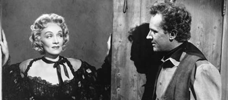
Rancho Notorious
1952 -
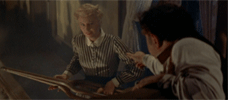
The Violent Men
1955 -
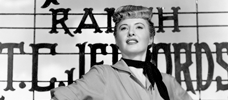
The Furies
1950 -
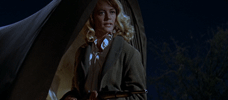
The Last Sunset
1961 -
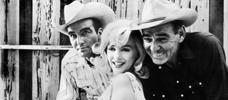
The Misfits
1961 -
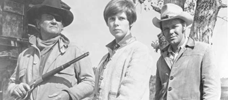
True Grit
1969 -
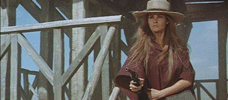
Hannie Caulder
1971 -
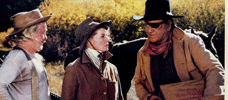
Rooster Cogburn
1975 -
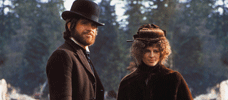
McCabe & Mrs. Miller
1971 -
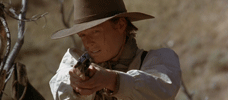
The Ballad of Little Jo
1993 -
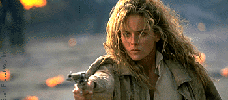
The Quick and the Dead
1995 -
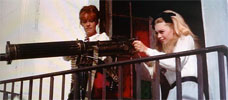
Viva Maria!
1965 -
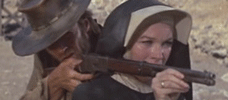
Two Mules for Sister Sara
1970
We don’t do comments anymore, but you may contact us here or find us on Twitter or Facebook.



